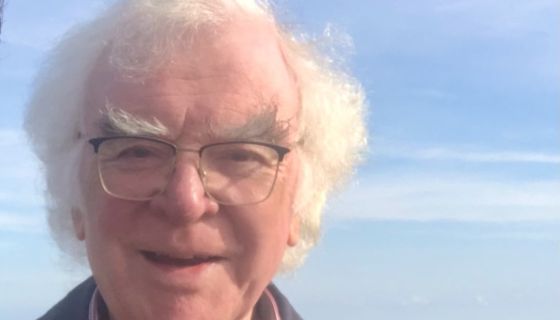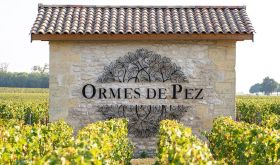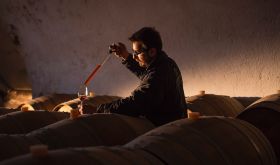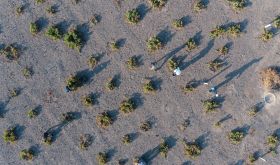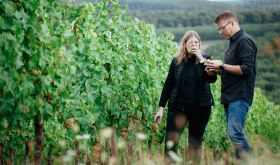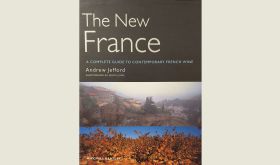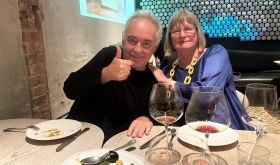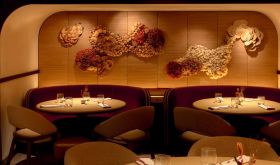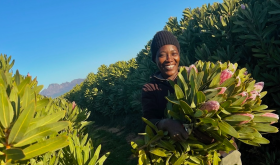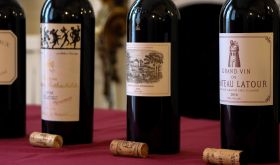Andrew Neather writes Andrew Neather is a British freelance journalist and wine blogger. He was the London Evening Standard’s wine critic 2005-2012. He lives in London.
The teacher
In truth, my father never knew that much about wine. But lifelong teacher that he is, he had just enough knowledge plus the enthusiasm and air of authority to make me think he knew a lot. So he convinced me that this dark red liquid in his glass – and later mine – was an intriguing and beautiful thing.
Having grown up in a council house in Cheltenham in the 1940s, my father first drank wine at the age of 16 – in France. It was the taste of escape. A bright working-class lad that made it to grammar school, his talent for languages was spotted by his French teacher, who sent him to work for a summer on a farm near Fontainebleau. In 1953, farm work in the village was still powered entirely by horses – and large amounts of gros rouge.
The experience changed my father’s life forever. It imprinted a whole new vocabulary on his memory (mine too: I know the French for a livestock curry comb only from his tales of being told, ”Edouard, vas étriller les chevaux!”). But it was a new world of tastes too - not least wine. And it was his future.
He came back to the farm on subsequent summers. Then, more than a decade after his first visit and the army, Cambridge and the start of his language-teaching career, he returned with his young wife. I was conceived in the farmhouse that summer of 1964. I don’t know what filled my parents’ glasses that evening around the big kitchen table, as the shadows lengthened in the farmyard outside: doubtless rough – but the taste of a different life.
When I first visited Montarlot 10 years later, I was allowed to try this magic liquid –after all, they gave it to toddlers mixed with water. Joli Grain NV was an astringent Vin de Table that appeared to be old Georges’s go-to red. Proof, perhaps, of the cultural cringe embedded in the English assumption that all French people know about wine. Except it was also proof of the way wine is woven into French life – in a tumbler at the kitchen table, with gruff comments on the day’s work, a part of the meal like the bread. It was this sense of wine as part of a French way of life that mattered to my father.
Yet this was not our life. On the occasions my father went to our village pub, ordering anything other than a pint would have been unthinkable. Even for middle-class parents like mine, the idea of drinking wine with a weekday supper would have seemed a wild extravagance. Wine appeared only with Sunday lunch, special meals or at parties.
The latter were a source of wonder to my brother and me. Tumbling out of bed the morning after one of my parents’ gatherings, we would race downstairs to collect the bottles and corks from amidst the ashtrays and unfinished cheese and pineapple cubes on cocktail sticks (this was the mid-1970s). The bottles in question: usually red Hirondelle, that notoriously anonymous Italian bottling from the European wine lake. I don’t know if my father knew or cared that it wasn’t actually French: these were the days when Augustus Barnett and Victoria Wine tempted less discerning drinkers with “Algerian Burgundy” and “Australian claret”. As for ordering wine by the case, my parents would have regarded that as a showy affectation of people much grander than us.
By my mid-teens, my father was both better off and had developed better taste in wine. Soon after – the early 80s – the appearance of a local Oddbins branch dramatically improved the range available to him. What’s more, by this age I was permitted to drink it too, allowing me to form my own judgment on this object of his passion (I had been able to decide much earlier that other passions of his, like the choral music he loved to play loudly at Sunday morning breakfast, were unbearable.)
He explored wine from Bordeaux, the Rhône, the Loire, all evocative of the country where he first tasted freedom. Once on a family holiday we simply drove around some of the Right Bank for my father to savour the thrill of actually being in Pomerol, while holding forth: always the teacher. My mother was annoyed; we never stopped to taste any wine.
Then on a school trip to France aged 17, I stood in a hypermarket mesmerised by the rows of bottles. I wanted to take my father home one but had no idea what they were. A teacher who was a wine lover plucked a bottle from the shelf: “Andy, if you love your father, get him this. It’s amazing.” “Hermitage” – worth a try. We drank it together for my father’s forty-sixth birthday. He pronounced it superb; I realised that I’d learnt enough to see that yes, it was indeed sublime – in fact, the best thing I’d ever drunk.
Our everyday tastes were less exalted. Before I left for university, we took a last family holiday together at a cottage in the Dordogne. Our elderly neighbour, a World War I veteran, offered to take us to a cousin who made a wine that was, he gestured emphatically, “comme ça”. After a discussion between the two men in Occitan patois, we came away with a five-litre jug of some of the roughest red I can recall tasting. We kept it on a painted tin tray in the kitchen until we realised the drips were eating away the paint.
I left home, then the country. I bought wine I couldn’t afford as an impoverished graduate student, with what was then one of the US east coast’s finest wine shops a mile from my home. I built up both debt and knowledge.
Following my return, aged 30, with my father retired from the university, we embarked on a series of summer mountain treks in France: “I’ve got ten good years left, Andy.” After long days on the trail we explored the magnificent parochialism of French mountain wines: Boudes and St Pourçain in the Auvergne, Apremont with our fondue in the Alps.
And then later, as a journalist, I fell into a job as a wine critic. I realised I had been merely a knowledgeable amateur. But not only did it transform my own understanding of wine: I finally became my father’s teacher. I took him bottles both good and more modest (he was always happy to accept the unwanted samples that newspaper critics get showered with.)
He changed his mind about some things. For instance, he had always had the idea that good red Burgundy was powerful, rich wine to match the fuss made about it, but repeatedly been disappointed by the bottles he could afford. The Burgundies and other pinot noirs I’ve drunk with him have convinced him that pinot is lovely, but in fact the most ethereal of red grapes.
I left journalism shortly after celebrating my fiftieth birthday. I knew the gift box that arrived from my father would be wine (all of our presents to each other are.) But I smiled at the symmetry of the half-case of J-L Chave Hermitage 2007 which I saw he’d given me.
I have never taken to some of my father’s passions, no matter how much he has enthused about them: opera, the novels of Jane Austen, French poetry. Yet in wine he transmitted not only a taste but the journey on which it had taken him. That journey nears its end: my mother is now too unwell to travel and they can no longer visit my Dad’s beloved France. But we still share a bottle and celebrate the vinous thread of our lives.
The photograph is the author's own.

